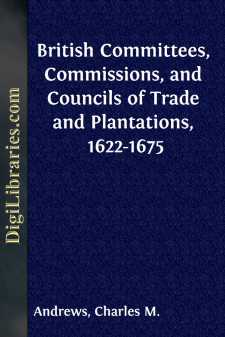Categories
- Antiques & Collectibles 13
- Architecture 36
- Art 48
- Bibles 22
- Biography & Autobiography 813
- Body, Mind & Spirit 142
- Business & Economics 28
- Children's Books 15
- Children's Fiction 12
- Computers 4
- Cooking 94
- Crafts & Hobbies 4
- Drama 346
- Education 46
- Family & Relationships 57
- Fiction 11828
- Games 19
- Gardening 17
- Health & Fitness 34
- History 1377
- House & Home 1
- Humor 147
- Juvenile Fiction 1873
- Juvenile Nonfiction 202
- Language Arts & Disciplines 88
- Law 16
- Literary Collections 686
- Literary Criticism 179
- Mathematics 13
- Medical 41
- Music 40
- Nature 179
- Non-Classifiable 1768
- Performing Arts 7
- Periodicals 1453
- Philosophy 64
- Photography 2
- Poetry 896
- Political Science 203
- Psychology 42
- Reference 154
- Religion 513
- Science 126
- Self-Help 84
- Social Science 81
- Sports & Recreation 34
- Study Aids 3
- Technology & Engineering 59
- Transportation 23
- Travel 463
- True Crime 29
British Committees, Commissions, and Councils of Trade and Plantations, 1622-1675
Description:
Excerpt
CHAPTER I.
Control of Trade and Plantations Under James I and Charles I.
In considering the subject which forms the chief topic of this paper, we are not primarily concerned with the question of settlement, intimately related though it be to the larger problem of colonial control. We are interested rather in the early history of the various commissions, councils, committees, and boards appointed at one time or another in the middle of the seventeenth century for the supervision and management of trade, domestic, foreign, and colonial, and for the general oversight of the colonies whose increase was furthered, particularly after 1650, in largest part for commercial purposes. The coupling of the terms "trade" and "foreign plantations" was due to the prevailing economic theory which viewed the colonies not so much as markets for British exports or as territories for the receipt of a surplus British population—for Great Britain had at that time no surplus population and manufactured but few commodities for export—but rather as sources of such raw materials as could not be produced at home, and of such tropical products as could not be obtained otherwise than from the East and West Indies. The two interests were not, however, finally consolidated in the hands of a single board until 1672, after which date they were not separated until the final abolition of the old Board of Trade in 1782. It is, therefore, to the period before 1675 that we shall chiefly direct our attention, in the hope of throwing some light upon a phase of British colonial control that has hitherto remained somewhat obscure. Familiar as are many of the facts connected with the early history of Great Britain's management of trade and the colonies, it is nevertheless true that no attempt has been made to trace in detail the various experiments undertaken by the authorities in England in the interest of trade and the plantations during the years before 1675. Many of the details are, and will always remain, unknown, nevertheless it is possible to make some additions to our knowledge of a subject which is more or less intimately related to our early colonial history.
At the beginning of colonization the control of all matters relating to trade and the plantations lay in the hands of the king and his council, forming the executive branch of the government. Parliament had not yet begun to legislate for the colonies, and in matters of trade and commerce the parliaments of James I accomplished much less than had those of Elizabeth. "In the time of James I," says Dr. Prothero, "it was more essential to assert constitutional principles and to maintain parliamentary rights than to pass new laws or to create new institutions." Thus the Privy Council became the controlling factor in all matters that concerned the colonies and it acted in the main without reference or delegation to others, since the practice of appointing advisory boards or deliberative committees, though not unknown, was at first employed only as an occasional expedient....


